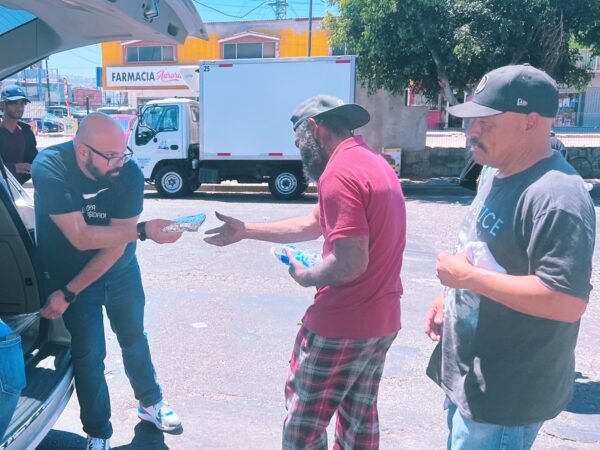Gustavo Muñoz of the San Diego Clinic distributes tacos to the sin casas in Tijuana
by Sofia Platti
I used to dream of being famous. Not like I wanted to be an actress — that would require so much work — but just that I wanted to be that known. To have that much of an impact. To know that much of my power. To have that much influence.
When I got a call from a friend asking if I would come to Mexico to be with her and her mom, something in me was an immediate yes. We’ve both been in our own spots with our moms. She moved in with her mom to take care of her as her mom was going through cancer treatments. I moved closer to my mom, physically and emotionally, to turn towards her as she was letting go of her own mother. We experienced the death of my grandmother, her mother, together. And it profoundly changed us both. I saw the depth of love between them when before all I could see was the pain and the fight. I saw the love in my own heart in a new way. I could hold the two of them through this experience together, helping my grandmother pass on to her next location. Doctors trying to help her “come back,” and I stood steady in the middle honoring her desire to let go of this life in this body. And I stayed steady with my mom as she felt the heartbreak of letting her mother go.
When I arrived in Mexico, I had no real idea of what it would look like, just that something in me felt called. I spent two days with my friend and her mom. I helped my friend make her mom juice in the morning. I cooked lunch for her mom one day when my friend was tired. Even when the two of them were fighting, I could only see the love there, this raw intense love — so delicate, not fragile, that could never be broken. My friend knew just the right amount of carrots and celery, ginger and beets to put in her mom’s juice to help her heal. What was really healing was the love between them, which became stronger and brighter each day.
The vow that we each made with our mothers was to honor the silent love that existed between us. Not the words that were said, but the feeling between us that is sometimes too vulnerable to acknowledge.
On the last day in Mexico, our driver was taking us to the clinic where my friend’s mother typically spends her mornings getting alternative treatments from an integrative oncologist. We passed a street with many sin casas as they are called in Mexico, which literally means people without homes. I felt that draw of the silent love that exists between everyone and the desire to serve that. I hadn’t noticed how many people without homes were painted across the whole city, that once you open your eyes to the silent realm, you can see so much more. It’s not a sad sight, or something to fix. It’s delicate, beautiful, and strong. People living their lives in front of you, as if their life is a piece of art and there is nothing to hide. The intensity is almost so much to see that I understand why at one point I covered it with a desire to “help those in need.” I am the one in need. I am the one with this desire to serve the silent, invisible parts of me and the silent, invisible parts of you. It’s incredibly vulnerable to live in that location, and here are thousands of sin casas, so beautifully receptive to what life brings their way. So on that last day of visiting with my friend and her mother, we came together to serve. We found a taco stand, run by a mother and her son, and ordered 40 tacos. We went and got water bottles and cookies and put together, quite rapidly, a meal, an offering for the invisible. There is something so profound that happens when you offer to the invisible. The need to be seen, to know your impact, dissolves and what you are left with is just your heartbeat meeting other beating hearts. It was from this location that Free Food Tijuana was born. A fullness of love and life spilling out and over.
I felt my impact that day, and it needed no billboard, it needed no hashtag. It was pure, raw, free of conditions.

 Get access to the monthly Rehumanization Magazine featuring contributors from the front lines of this effort—those living on Death Row, residents of the largest women’s prison in the world, renowned ecologists, the food insecure, and veteran correctional officers alike.
Get access to the monthly Rehumanization Magazine featuring contributors from the front lines of this effort—those living on Death Row, residents of the largest women’s prison in the world, renowned ecologists, the food insecure, and veteran correctional officers alike.